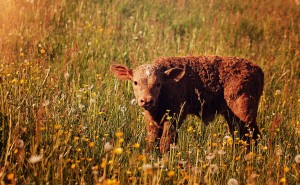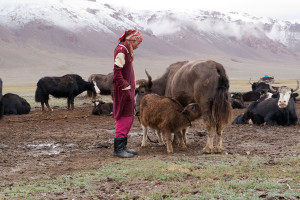A friend sent me this video, in which the speaker aims to convince us that drinking milk is unnecessary and harmful. To convey the absurdity of our habit, he highlights an obvious fact that many fail to consider: milk is produced by mammals to feed their babies.
Milk is species-specific: camel milk is designed to meet the unique needs of a growing infant camel, cow’s milk meets the specific needs of calves, human milk those of baby humans. They are not interchangeable; nature has tailored the milk of each species to the unique needs, growth rate, and physiology of the infants of that species. A baby whale will not thrive on human milk. Likewise, milk is designed to meet the particular needs of infants, not adults. All mammals wean their young and move them on to other foods. Only humans graduate to the milk of another species.
This novel behavior is so normalized that we rarely think about it. The function of lactation in a cow is evidently not to feed humans, and humans have not evolved to be shackled to a cow’s udder until death. Without a doubt, our behavior is unique in the animal kingdom.
The responses to the video show that most people were having none of its anti-dairy message. One commenter pointed out that while humans are indeed the only species to drink the milk of another species, we are also the only ones to skydive, race cars, or do other things that define our civilizations. If drinking milk is weird, so are most of the activities that make up human history.
 When I first went vegan, I shared the perspective of the video’s speaker. I realized that we were the only animals to drink the milk of other species, as adults no less, that to do so we were robbing babies of the one food they need to be healthy, and the whole affair seemed bizarre. But my perspective has changed and I now tend to agree with the commenter.
When I first went vegan, I shared the perspective of the video’s speaker. I realized that we were the only animals to drink the milk of other species, as adults no less, that to do so we were robbing babies of the one food they need to be healthy, and the whole affair seemed bizarre. But my perspective has changed and I now tend to agree with the commenter.
To be sure, for humans to drink cow’s milk goes against the purpose of the milk from the perspective of cows and nature. What has shifted is that I think differently about the relationship between naturalness and weirdness. That a small group of humans at a recent point in our history domesticated certain animals to exploit their bodies and labor, and took their milk while they were at it, is not all that strange in light of the diverse and ingenuous ways that humans have expanded into and dominated their environments.
Humans who domesticated bovines, milked the females, and adapted by producing lactase past the age of weaning, benefited from it. The nutritional makeup of the milk wasn’t ideal, but nonetheless, they got calories out of it, with fat and protein and all that good stuff. Drinking milk is unethical, but it’s not weird by human standards. However, the idea that human children require milk is a strange conclusion to reach. We’ve been made to believe that cow’s milk is not just another source of calories, instead that it’s a unique beverage upon which human children are engineered to be dependent.
When I was growing up, I wasn’t told that the world is replete with foods containing protein and calcium and fat. What I was told was that I needed milk to grow and be healthy. As an adult, I was told by an endocrinologist that if I wasn’t drinking milk, I could be sure that I had countless deficiencies. Drinking cow’s milk may not be weird, but believing that humans require cow’s milk is very weird.
 Let’s think about the implications of this belief. Did humans evolve to be dependent on cows? Even though we domesticated them (and the few other animals who are milked) so very late in our history? Even though most human cultures never developed dairying at all? Why would we have to go through the arduous task of domesticating other animals to get the nutrients we need to grow to adulthood? Would this not have doomed our species early on? If the history of dairying shows us anything, it is how very adaptable humans are, whereas this belief paints a humanity that is stubbornly dependent on one very specific and difficult to procure food.
Let’s think about the implications of this belief. Did humans evolve to be dependent on cows? Even though we domesticated them (and the few other animals who are milked) so very late in our history? Even though most human cultures never developed dairying at all? Why would we have to go through the arduous task of domesticating other animals to get the nutrients we need to grow to adulthood? Would this not have doomed our species early on? If the history of dairying shows us anything, it is how very adaptable humans are, whereas this belief paints a humanity that is stubbornly dependent on one very specific and difficult to procure food.
Through milk, we see an example of social norms being so entrenched that we never pause to render explicit the ideas that support them, and without doing this, we don’t give ourselves the opportunity to reject them. The belief that cow’s milk is necessary to humans is absurd because it’s based on an absurd model of how nature works.
The representations of humans that underlie Western milk-drinking culture (Three glasses a day! The more the better! Lactose-free milk for the lactose-intolerant!) also point to a narrative of lack. I’ve written about a narrative of lack in regards to the colonization of Mexican food culture, but in this case, the ideas that humans are dependent on cows and that the world’s vast array of plant foods can’t provide our calcium affect us all. To unpack these narratives and unearth the representations that inform our habits may seem like a mere exercise in abstraction, but they have concrete effects on everything from our health to the policies that we support with our tax dollars. Deconstructing them is an important part of the effort to create a food system built around nourishing people, not lining shareholder pockets. As we unpack dominant ideas, we can consider whether they make sense, whom they serve, and what their alternatives might be.
Many myths of scarcity dominate our increasingly globalized food system: they serve to legitimize corporate takeover and westernization, loss of sovereignty and biodiversity. As I unravel them, I will also share stories of abundance. Like tortillas and chia seeds in Mexico, other countries are rich in foods, traditions and biodiversity that are overlooked, undervalued, erased and destroyed. If we want to defend them, we need to truly understand that there is something to defend and build upon. In the meantime, I posit that nature has offered humans an abundance of nutritious plants to eat, that we can thrive without the milk of other animals, and in fact, we’re best off without.

